The funny thing about RSS is that it is always a topic of discussion. One day, someone is talking about the “revival” of RSS, the next – someone tries to justify why RSS is still a thing, or why it’s a must-use service. The fact of the matter is that RSS never went anywhere. It is, to this day, the best method for keeping up with the latest news and blog posts from a large subset of sources.
Even if a blog/website/publisher doesn’t have an RSS feed (very unlikely) – you can use something like The RSS Bridge to generate one. And if you think you can keep up with 100+ content feeds with only social media or a bookmarking site – you’re sorely mistaken.
What’s the deal with RSS readers charging money, anyway? The most simple answer to this question is that fetching RSS feeds all day long for thousands of users has a significant cost in terms of data storage and server capabilities. On top of that, many popular (premium) RSS Readers provide additional features included in the cost. That said, this post is focused primarily on free software, with a few exceptions where appropriate.
The goal of this blog post, then, is to provide a concise list of free-to-use RSS readers. I’ve put together a varied mix of both Browser and Desktop-based readers. The advantage of a Browser-based RSS reader is that you can also use it on your mobile device.
I’m also going to talk about a few open-source projects that you can fork yourself and implement new features as needed. If you’re working on an open-source RSS reader and it’s not on this list – feel free to ping me on Twitter or email me, and I’ll see what I can do.
One last thing, if you decide to use one of the self-hosted solutions and don’t want to host it on your own device – I have compiled a separate article on free hosting solutions for developers. The list includes crowd favorites like Vercel, Netlify, and others. In most cases, if you don’t start monitoring tens of thousands of feeds at once – a free plan should suffice for basic needs.
Fluent Reader
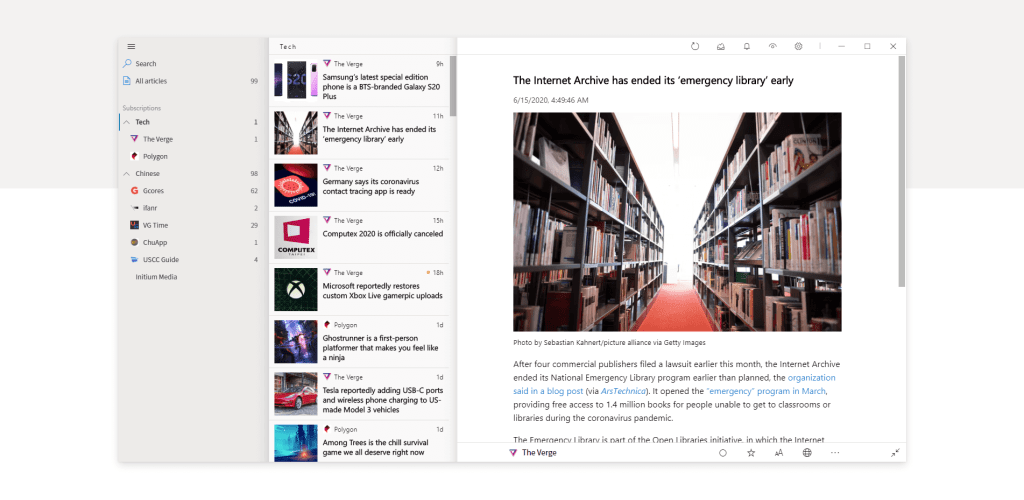
As I spend so much time on my Desktop anyway – I don’t mind using standalone software such as Fluent Reader. And because it has a clean UI with some nifty features (privacy-friendly) – it’s easily my top pick. It’s also built with a familiar stack; Electron, React, and Fluent UI.
One of the key features for me was the ability to import OPML files from other services, thus saving me time from needing to reenter feeds manually. Additionally, Fluent Reader supports syncing with external services like Feedbin, Inoreader, and others.
Fluent Reader does have a mobile version, also. The Lite version is built on the back of Flutter and has almost all the same features as the Desktop version. You can download and compile it from the source yourself, but if you get it from one of the app stores – there is going to be a small fee attached to the app. This is to cover the yearly fees that app stores impose on developers.
Inoreader
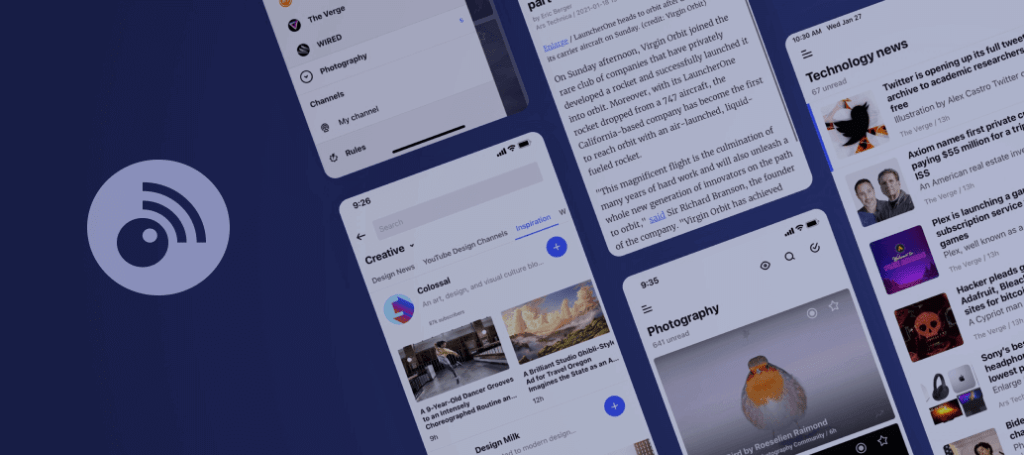
Inoreader is the first of 3 (in this list) browser-based RSS readers with a freemium model. So, in the case of Inoreader – the maximum number of feeds you can add is capped at 150. Which, to be fair, is still a decent number of feeds, particularly if you only want to monitor niche blogs.
That said, plenty of people (particularly in the developer community) are happy to pay for the premium plan because it provides additional features. In the case of Inoreader, those features are an adless experience, custom styling, automation, filters, and advanced tools like translation.
The filter system, in particular, is extremely powerful. You can create custom notifications or perform actions based on the smallest of details. For example, if a particular feed item has a certain word in its title – you can send yourself an email or a push notification about it.
Inoreader also has a mobile app on Apple Store and Google Play.
Feedly
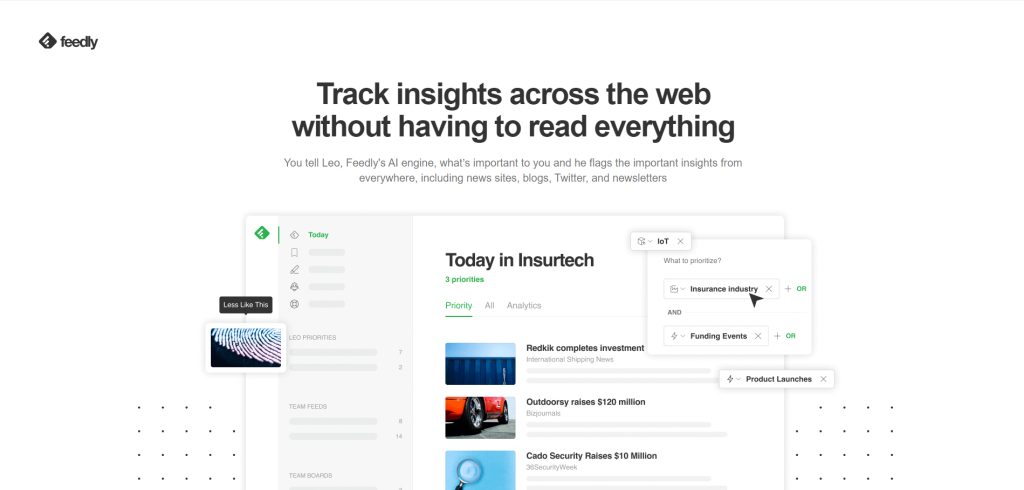
Feedly has been around since 2008, though it wasn’t until 2013 (when Google Reader was discontinued) that the platform picked up some serious pace. The browser-based reader app is now one of the world’s most popular solutions for fetching and managing RSS feeds.
It’s also the reader that I myself prefer to use. Their interface is clean and accessible. And, in recent years, they’ve made several leaps in adding unique features. The most notable of which is their AI engine “Leo” – an intuitive algorithm that can understand your reading patterns and sort out feeds automatically based on what you like to read the most.
Last but not least, Feedly has its own Explore directory, which has upwards of 100,000 various feeds indexed by categories. So, if you’re just signing up and don’t have an OPML file ready – their feed directory will help you quickly find relevant feeds to your interests.
NewsBlur
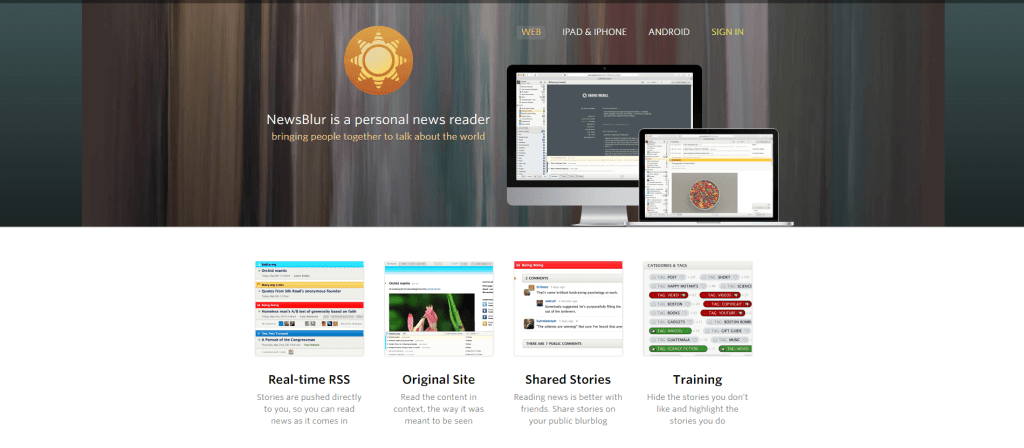
NewsBlur has been in active development for over a decade. While the service does have a freemium model, it is limited to only 64 feeds at a time. But, if you have the resources – you can check out the GitHub repo for NewsBlur and maybe try putting together a build yourself. From what I understand – it might actually be cheaper to just subscribe to their service, though.
Some notable features include the ability to track article changes over time. This is particularly useful for reporters who may then avoid having to subscribe to an additional service. NewsBlur also supports channels like social media (Twitter), YouTube, and email newsletter subscriptions.
It is available in the Browser, and also on smartphones (Apple & Android).
yarr
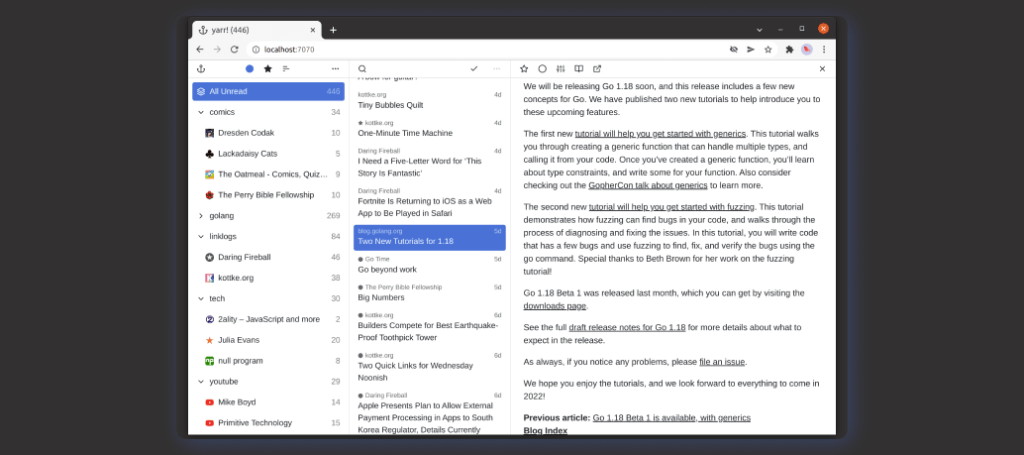
Let’s talk about YARR—Yet Another RSS Reader. Now, you might be thinking, “Do we really need another RSS reader?” But stick with me here. YARR stands out from the crowd, and not just because it has a pirate-inspired acronym. It’s built to be simple, fast, and efficient, essentially designed to get the job done without unnecessary bells and whistles.
First off, what is YARR good for? RSS readers, in general, let you aggregate content from various websites into one unified platform. Imagine having a single newspaper that only has the articles you care about. That’s what an RSS reader does for your online content. YARR makes this task remarkably straightforward. It’s lightweight and doesn’t hog system resources. You’re not going to find yourself watching that dreaded spinning wheel while waiting for feeds to update.
How does YARR stand out from its competitors? It’s all about streamlining. This isn’t a swiss army knife of features; it’s more like a well-honed chef’s knife, specialized and effective. The interface is clean, the settings are minimal, and it’s highly user-friendly. It won’t make your morning coffee, but it will make your morning read a whole lot smoother.
So, you might be asking, “Is YARR for me?” If you crave efficiency and simplicity, then the answer is likely a resounding yes. The program doesn’t try to be all things to all people, and that’s its strength. It aims to streamline your online reading experience, nothing more and nothing less. And in a world where apps are often overloaded with unnecessary features, that’s a breath of fresh air.
Stringer
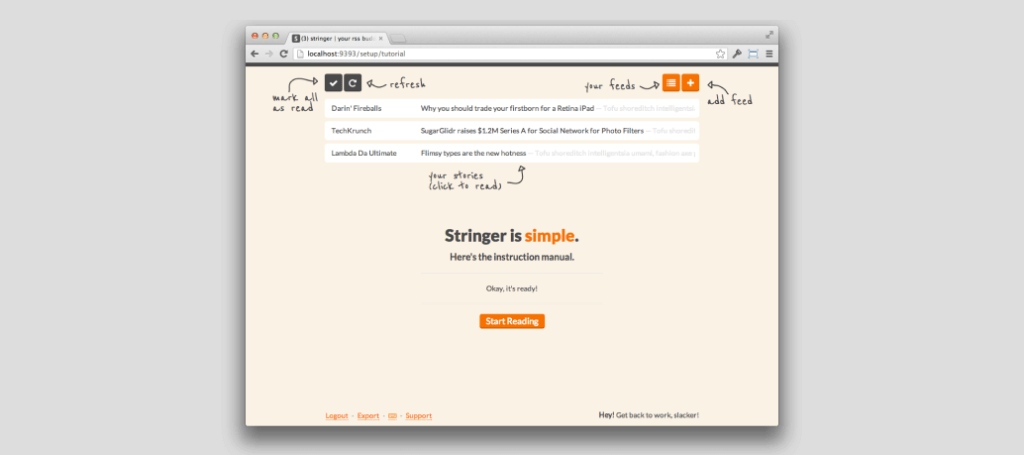
If all you need is a simple interface that can fetch feeds for you – Stringer is the answer. This minimalist feed reader/fetcher has no additional features besides fetching RSS feeds and indexing their content. Thanks to its small footprint, it will be possible to run Stringer from any cloud provider that offers a free plan. This we already learned at the intro, though.
Miniflux
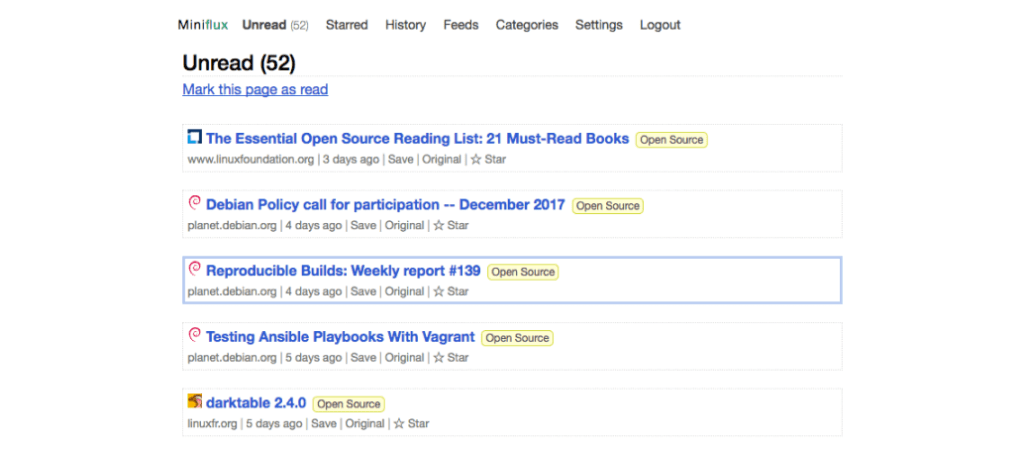
Miniflux is a minimalist, open-source RSS reader that appeals to users who yearn for simplicity without sacrificing functionality. It adheres to the ethos that less is more, offering a clean and distraction-free interface to consume your daily news feeds. You won’t find any bells and whistles like social sharing buttons or integrated commenting systems. But that’s intentional. The tool aims to do one thing and do it well: provide a streamlined platform for RSS feed reading.
Written in Go, Miniflux is lightweight and fast, qualities that make it stand out in a crowded market. It supports a variety of formats including RSS, Atom, and JSON Feed. A key feature that distinguishes Miniflux is its focus on privacy. There are no tracking scripts or analytics tools embedded into the reader. Your data stays yours.
On the customization front, it offers features such as categorizing feeds, marking items as favorite, and various sorting options. While it might lack the community-driven extras of some other platforms, it more than makes up for it with its focus on speed, efficiency, and privacy.
NetNewsWire
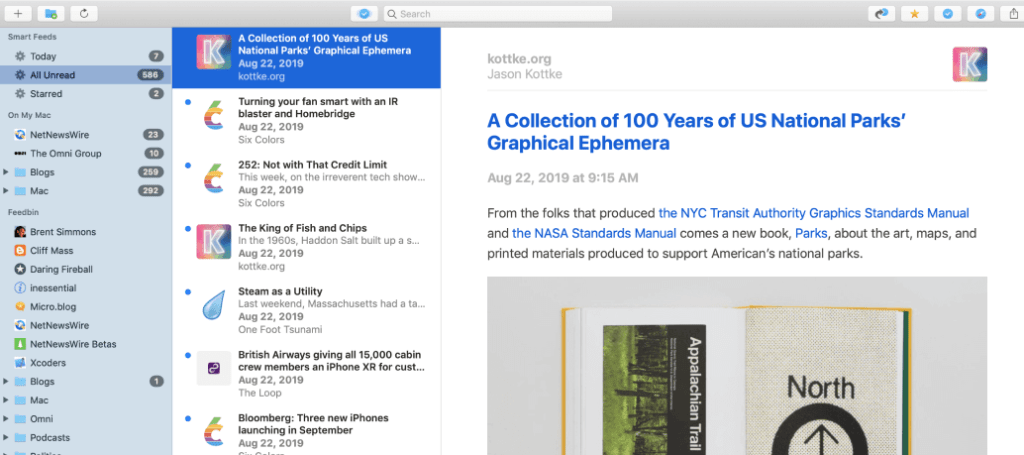
If you’re on the hunt for an RSS reader and you’re in the Apple ecosystem, you might want to turn your attention to NetNewsWire. Why, you ask? Well, this isn’t just another feed reader; it’s a venerable piece of software with a history dating back to 2002. Yeah, it’s been around the block, and it knows its stuff.
Now, what sets NetNewsWire apart? First off, it’s open-source. That means a community of passionate developers are continually refining it, making sure it stays up to snuff. It’s primarily focused on macOS and iOS, so if you’re in the Apple camp, you’ll find it fits like a glove in your daily workflow.
Speed is the name of the game here. The app is optimized to the hilt, ensuring that you get your news and articles without any lag. We’re talking about a clean, uncluttered interface that makes reading a joy, not a chore. Don’t like the default look? No worries; you can tweak it to your heart’s content.
Now, let’s talk features. You get the usual suspects: the ability to sync between devices, manage your subscriptions, and categorize your feeds. But there are also some quality-of-life improvements like the option to read articles in a “Reader View,” which strips away any extra fluff and lets you focus on the text.
Privacy-conscious? NetNewsWire’s got your back. No tracking, no analytics, just you and your feeds.
Tiny Tiny RSS
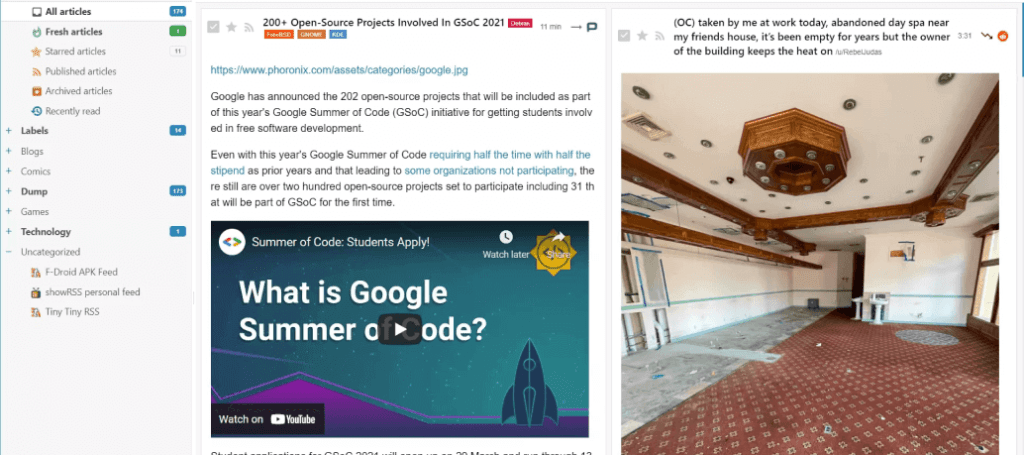
Tiny Tiny RSS (often abbreviated as TTRSS) is a free and open-source web-based news feed reader and aggregator. It’s written in PHP and uses a database to store its data—usually MySQL, PostgreSQL, or SQLite. What sets TTRSS apart from other feed readers like Feedly or Inoreader? It’s the fact that you can host it on your own server. This offers an extra layer of control and privacy, as you’re not entrusting your data to a third-party service. It’s akin to having your personal mailbox as opposed to a P.O. Box that everyone can access.
What are the primary advantages of using TTRSS? First, the self-hosted nature of the application offers greater control over your own data. No more terms of service dictating how your reading habits are logged or monetized. Second, it supports a variety of plugins and themes. Want to filter out specific types of news or add a unique skin to your interface? Go ahead. Third, its API enables integration with a variety of mobile apps, so you can catch up on your feeds while you’re on the move.
The setup process may deter the less technically inclined, as you’ll need a web server and database to get TTRSS running. But isn’t a bit of elbow grease worth it for the sake of autonomy and privacy? Once you get past the initial setup, you’ll find that TTRSS offers a smooth and customizable experience that rivals any of its mainstream competitors.
Any drawbacks? Updates can sometimes break plugins, and its open-source nature means you’re often reliant on community support for troubleshooting. Still, for those willing to get their hands a bit dirty, TTRSS offers an effective and private alternative for RSS feed aggregation.
Summary
In sum, the realm of RSS readers offers an array of free options, both browser-based and desktop-bound. Whether you’re inclined towards the minimalistic design of Feedly or the robust feature set of Inoreader, the choice largely depends on your individual needs and how you interact with your news feed. Do you prioritize user interface or are you more concerned with customization options? These are questions only you can answer.
The software landscape is littered with tools that promise the best reading experience, but at the end of the day, ‘best’ is subjective. What works for one user might not click for another. Our rundown aims to provide a comprehensive guide to help you make an informed decision. But remember, the best way to find your perfect match is to test these options out for yourself. Who knows, you might stumble upon features you never knew you needed. So, what are you waiting for? Dive in, and take control of how you consume your news.
